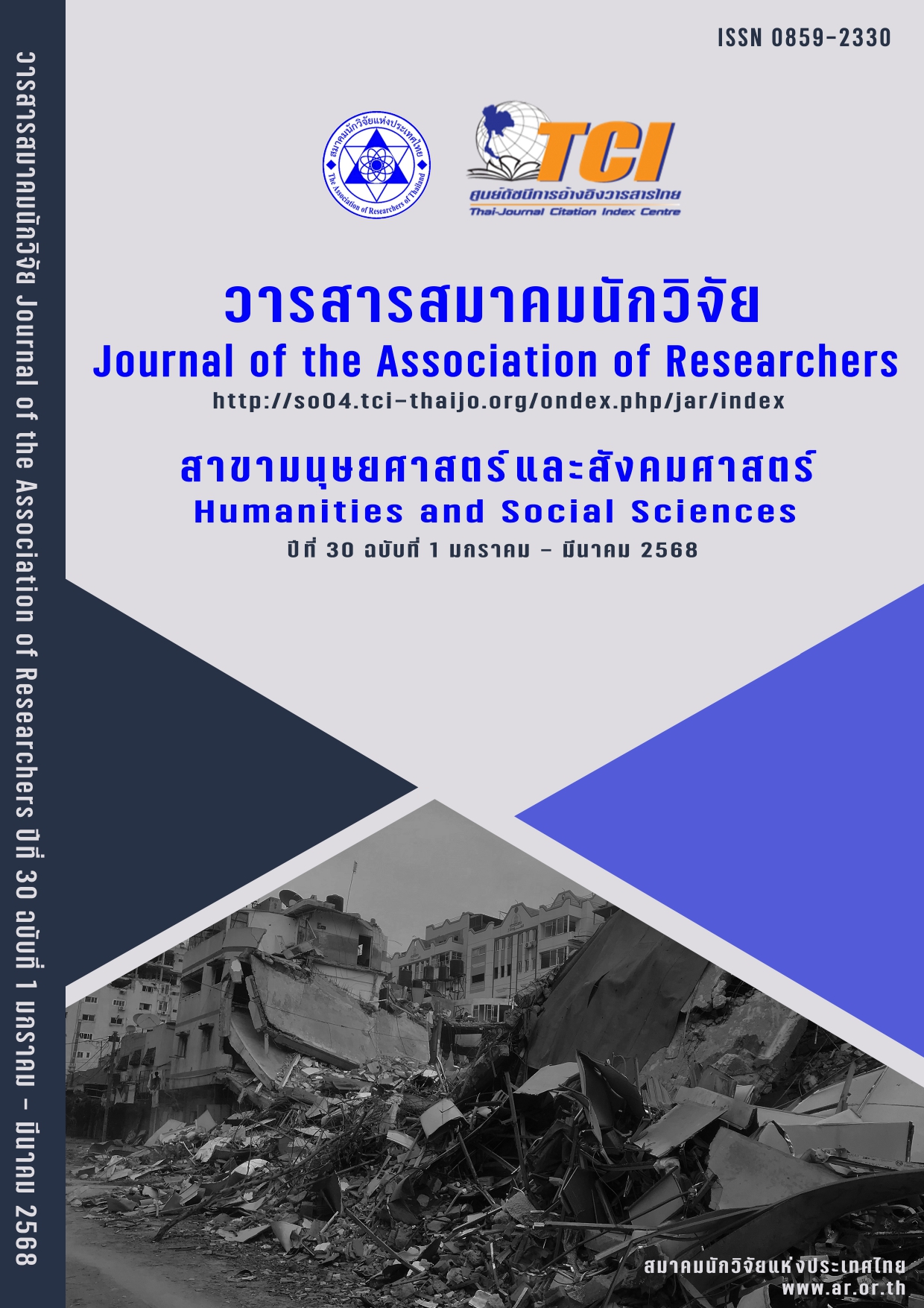Khok Nong Na Model : Homeschooling for Elementary Education
Main Article Content
Abstract
This research Article aimed to 1) study the conditions and approaches for managing homeschooling at the elementary level using the "Khok Nong Na Model," 2) develop an innovative learning management package for homeschooling, and 3) present the innovative learning management package. This study employed a mixed-methods approach. The target groups included: 1) two homeschooling families, 2) three networks implementing the "Khok Nong Na Model," 3) 15 experts with knowledge and experience in education, and 4) 46 elementary students selected through purposive sampling. The research instruments included interviews, learning management plans, and questionnaires. Data were analyzed using descriptive statistics and content analysis. Research Findings The results indicated that most homeschooling arrangements were based on the readiness of families, local wisdom, and social capital. The approach to learning management involved four key components: 1) support networks, 2) an educational curriculum, 3) learning resources, and 4) educational processes. The innovative learning management package consisted of eight components: 1) essential content, 2) standards and indicators, 3) learning content, 4) integrated learning content, 5) competency-based objectives, 6) teaching and learning activities, 7) media and learning resources, and 8) assessment and evaluation. The learning package comprised nine innovative components: 1) "Grow Your Vegetables," 2) "Sky Garden Planting," 3) "One Hole One Menu," 4) "Compost Making," 5) "Growing Lemons in Cement Pipes," 6) "This House Bears Fruit," 7) "Rice Conservationist," 8) "Golden Ridge," and 9) "Khok Nong Na." After applying this package, students reported a high level of satisfaction, indicating the effectiveness and suitability of the learning innovation.
Article Details

This work is licensed under a Creative Commons Attribution-NonCommercial-NoDerivatives 4.0 International License.
บทความที่ปรากฏในวารสารนี้ เป็นความรับผิดชอบของผู้เขียน ซึ่งสมาคมนักวิจัยไม่จำเป็นต้องเห็นด้วยเสมอไป การนำเสนอผลงานวิจัยและบทความในวารสารนี้ไปเผยแพร่สามารถกระทำได้ โดยระบุแหล่งอ้างอิงจาก "วารสารสมาคมนักวิจัย"
References
สมจิตร์ ยิ่งยงดำรงฤทธิ์. (2551). การจัดกระบวนการเรียนรู้ของกลุ่มผู้จัดการศึกษาโดยครอบครัว ตามพระราชบัญญัติการศึกษาแห่งชาติ พ.ศ. 2542.
สุทธิลักษณ์ กันธิพันธ์ และคณะ. (2565). การศึกษาสภาพและแนวทางการจัดการศึกษาขั้นพื้นฐานโดยครอบครัว ในศตวรรษที่ 21, วารสารพิกุล คณะมนุษยศาสตร์และสังคมศาสตร์ มหาวิทยาลัยราชภัฏกำแพงเพชร, 20(1). 247-265.
สำนักงานคณะกรรมการการศึกษาขั้นพื้นฐาน กระทรวงศึกษาธิการ. (2552). หลักสูตรแกนกลาง. การศึกษาขั้นพื้นฐาน พุทธศักราช 2551 .กรุงเทพฯ: ชุมนุมสหกรณ์การเกษตรแห่งประเทศไทย. พระราชบัญญัติการจัดการศึกษาแห่งชาติ 2542.
รุจนี เอ้งฉ้วน และคณะ. (2558). การจัดกระบวนการเรียนรู้แบบโฮมสคูล: กรณีศึกษาครอบครัวในภาคใต้, วารสารหาดใหญ่วิชาการ, 13(2). 103-116.
Gann, C. & Carpenter. D. (2018). STEM Teaching and Learning Strategies of High School Parents With Homeschool Students, CUP Faculty Research. 26.https://digitalcommons.csp.edu /cup_commons_faculty/26.
Translates in Thai Reference
Chalermchai, Y. & Chalermchai. U. (2000).The Model and Development of Homeschooling in Thai Society. Bangkok: Pimdee.
Engchuang, R. (2015). Homeschooling Learning Process: A Case Study of Southern Thai Families. Hatyai Academic Journal, 13(2). 103-116. (In Thai)
Kanthiphan, S. et al. (2022). A study of the conditions and guidelines for organizing basic education by families in the 21st century, Pikul Journal, Faculty of Humanities and Social Sciences, Kamphaeng Phet Rajabhat University, 20(1). 247-265.
Ministry of Education. (1999). National Education Act B.E. 2542 (1999). Retrieved from https://www.bic.moe.go.th/images/stories/Porobor._2542(In Thai).
Ministry of Education. (2008). Basic Education Core Curriculum B.E. 2551 (2008). Bangkok: Office of the Basic Education Commission. (In Thai).
Nakornthap, A. (2000). Homeschooling: International experiences. Bangkok: Seven Printing Group. (In Thai).
Yingyongdumrongrit. (2008). Learning Process Management of Home School Group According to The National Education Act B.E.2542, (In Thai).


